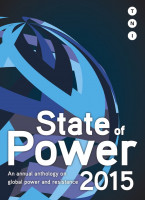Foucault, power and abuse of authority Towards a sociology of corruption in Zimbabwe
Corruption and power are currently framed as individual acts without understanding the broader network of power and how it influences access and exclusion in Zimbabwe. Removing corrupt politicians is not sufficient to eradicate poverty but what is required is a fundamental change of the relations of power based on unequal structures.

Authors
Abstract
Invoking a Foucauldian lens to understanding corruption in Zimbabwe provides interesting analysis of how power is at the centre of this phenomenon. In Zimbabwe corruption has emerged as the biggest threat to poor people’s livelihoods as it impacts of spheres of live. This paper provides a nuanced analysis of how corruption is essentially a problem of power.
It uses everyday examples of live in Zimbabwe to highlight the pervasiveness of power in the analysis of corruption. The paper provides a foundation for the development of the sociology of corruption in Zimbabwe by questioning how corruption and power are currently framed as individual acts without understanding the broader network of power and how it influences access and exclusion. The paper argues that removing corrupt politicians is not sufficient to eradicate poverty but what is required is a fundamental change of the relations of power based on unequal structures.
Introduction
Corruption in Zimbabwe has devastating effects on the ability of poor people to access basic services. Research on corruption has tended to focus on how political leaders and administrators use their position to amass wealth. There is also a growing field of study in petty corruption occurring in all sectors of social and economic life. All these forms of corruption are intricately linked to power. Corruption can be considered as essentially a problem of power.
This paper uses Foucault’s perspectives on power to highlight how corruption in all its forms is intricately linked access to and exercise of various forms of power. Conventional studies (Zakiuddin, 2000) define corruption as the abuse of public power for private gain which leads to an instrumentalist view of power. Such an analysis hides the relational and micro workings of power. In this sense, power is understood as possession, as something owned by those in power. Borrowing from Foucault power is not something that can be owned, but rather something that acts and manifests itself in a certain way; it is more a strategy than a possession. Power has to be understood as a system in which network of relations are in which individuals are the vehicles of power, not its points of application (Foucault, 1980). This understanding of power thus provides a better analysis of corruption in which simply focusing on ruling elites in Zimbabwe as ‘holders’ of power hides interesting dimensions into how a change in the relations of power and not only a change of politicians is the best of fighting corruption.
Corruption is often described as an individualistic act which involves the use of authority for personal gain (Hodgson and Jiang, 2007). When building towards sociology of corruption the emphasis is on understanding corruption as a social rather than individual phenomenon. That is why a focus on power emphasises the social nature of corruption: “Corruption can be seen not so much as an objective practice existing in a vacuum, but as a social act whose meaning needs to be understood with reference to social relationships” (Harrison, 2006, p. 15). Power from a Foucauldian perspective is also defined from a social relationship perspective which allows for an analysis of corruption as social act. In this way the focus is on the social institutions and not individuals in understanding the origins, mechanisms and solutions to the problem of corruption.
Conclusion
Corruption in Zimbabwe needs to be understood within a context in which access to the most basic services is mediated by some form of bribery and nepotism. Using Foucault ideas we can map an emerging sociology of corruption based on analysing how various forms of power a deployed as strategies to accumulate even at the most basic levels. From petty corruption to big political scandal, it is possible to decipher how various forms of power situated in different relationships are connected to corruption. Power is not a property but a strategy. It we understand corruption as the strategic deployment of power not only to accumulate but also as a livelihood strategy for example cases of petty corruption by lower level officers such as a teacher selling exam papers to students. Power like corruption is a social process. It is not a thing that can be possessed. Through such an analysis the paper has shown how corruption has to be understood as a social phenomenon. Corruption has become normative because of people’s acceptability of these activities in the guise of survival strategies.
Using a cross section of cases, the paper has highlighted how power understood as diffuse helps in understanding the pervasive nature of corruption. The paper has provided a base point of developing the sociology of corruption in Zimbabwe. It argued that corruption is a social issue and needs to be studied within everyday relationships of people in society. Individuals are implicated in corruption scandals but they do not operate in a social vacuum. Analysis of the micro physics of power within social contexts can provide new and interesting ways of understanding corruption. The paper concludes that like power, corruption is everywhere. It is not limited to one class or group; it takes various forms from low level petty corruption to political corruption. In all these instances power is deployment as a strategy to ensure benefit for individuals. To combat corruption there is need to realize that it is beyond removing or arresting individuals but rather reforming social system that promote asymmetrical power relations.
